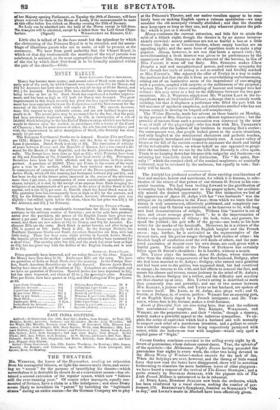THE THEATRES.
Ma. WEBSTER, the lessee of the Haymarket, needing no relaxation from his managerial labours, so light has success made them, and covet- ing no " recess " for the purpose of beautifying his theatre—which nevertheless it is desirable he should do at a convenient season—has ob- tained a second extension of the regular season, which now "follows still the ever-running year." Of course other managers, equally ena- filtered of fortune, have a claim to a like indulgence ; and since Drury seems likely to invalidate its " patent " by banishing the "legitimate Airama" during an entire season—for the German Company are to play at the Princess's Theatre, and our native vocalists appear to be reso- lutely bent on making English opera a ruinous speculation—we may consider the old monopoly virtually abolished • and that the theatres may keep open as long as they can, and play whatever pleases the pub- lie: which is just as it should be.
Money continues the current attraction, and bids fair to attain the eclat of a fiftieth night, though the theatre is by no means inconve- niently crowded : scanty audiences are not so fearful a loss at a little theatre like this as at Covent Garden, where empty benches are an appalling sight ; and the mere force of repetition tends to make a play popular. Money, however, is not one that bears a second visit; for, notwithstanding a fresh interest was given to its performance by the appearance of Mrs. Stumm° in the character of the heroine, in lieu of _ Miss Eire's', it went off but flatly. Mrs. STIRLING makes Clara Douglas a real and unsophisticated person, and excites sympathy for her ; though her style of acting is not so studied and forcibly marked as Miss FAUCIT'S. She rejected the offer of Evelyn in a way to make the audience feel that she did it from an overwhelming embarrassment,. arising out of an instinctive sense of the imprudence of enccuraging such a passion, coupled with surprise at the suddenness of the proposal; whereas Miss FAUCIT threw something of hauteur and temper into her refusal : this may serve as a key to the difference between the two per- sonations. Mr. J. WEBSTER supplanted Mr. WALTER LACY in the in- significant tart of SirFwedewich Blount; a change that is scarcely worth noticing, but that it displaces a performer who filled the part with its full measure of apathetic emptiness, and substitutes another who has not repose enough to develop its languid self-complacency. The Widow Barnaby, made her advent on these boards on Monday, in the person of Mrs. GLOVER—a most efficient representative but the promise of success from such a personation was destroyed by the utter want of skill of the playwright—who has dealt with Mrs. TROLLOPOL novel much after the fashion of his brethren in treating Box's stories : the consequence was, that people looked grave at the comic situations, and only laughed at the sentimental characters and pathetic touches, alike strangely introduced and inappropriately cast. A smart volley of hisses at the fall of the curtain seemed to announce the death and burial of the redoubtable widow, on whose behalf no one appeared to propi- tiate the audience ; but we see by the bills that Barnaby is alive again. There is no keeping down her irrepressible vulgarity and fussiness--no subduing her insatiable desire for distinction. The "Be quiet, Bar- naby !" which the comical clerk of the comical magistrate so comically reiterated, may be reechoed by the audience, but equally in vain : Bar- naby will be heard.


























 Previous page
Previous page